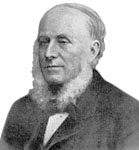Chapter 2. "Conscience Is Learned" by Alexander Bain

Alexander Bain, Thoemmes
About the author…
Alexander Bain (1818-1903) was self-educated until he entered Marischal College in Aberdeen Scotland. He became drawn into utilitarianism and empiricism. As one of the founders of British psychology, he sought to explain all mental processes in terms of physical sensations. His books The Senses and the Intellect (1855) and The Emotions and the Will (1859) were standard textbooks in psychology well into the next century. Bain founded the psychological journal Mind in 1876—today it's a well-known philosophy journal.
About the work…
In his Moral Science,[1] Bain uses his insight into the nature of the will for an explication of ethical theory. In many ways, Bain anticipated pragmatism. In the brief selection below, he explains the origin of conscience and how conscience is shaped. If Bain is correct, conscience is not a reliable guide to a consistent ethics across different cultures and different times.
Ideas of Interest from Moral Science
How does Bain define "conscience"? Is his definition congruent with the contemporary use of the word?
According to Bain, how are the emotions and self-interest related to conscience?
How is conscience shaped by education, law, and authority? Explain what Bain means by the "effect of contiguous association"?